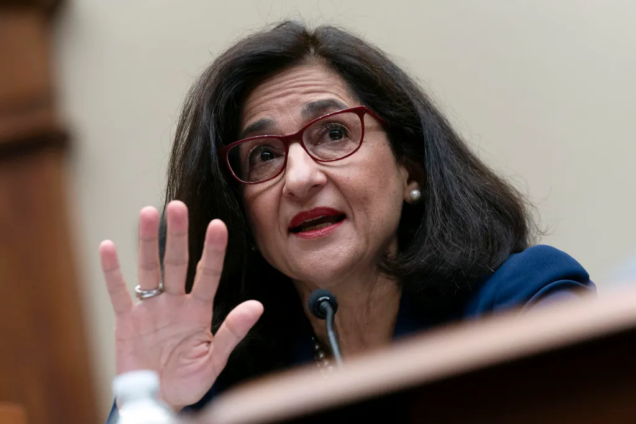Columbia University President Minouche Shafik resigned effective immediately, the head of the prestigious New York university announced in a message to the university community on Wednesday.
Columbia’s upper Manhattan campus was at the center of a protest movement connected to the Israel-Hamas war that swept college campuses nationwide with thousands arrested and end-of-year graduation ceremonies disrupted. In her statement, she acknowledged those protests factored into her decision.
“This period has taken a considerable toll on my family, as it has for others in the community,” Shafik wrote. “Over the summer, I have been able to reflect and have decided that my moving on at this point would best enable Columbia to traverse the challenges ahead.”
In addition to the protests, the school in July removed three deans, who have since resigned, after officials said they exchanged disparaging texts during a campus discussion about Jewish life and antisemitism.
Shafik said in a July 8 letter to the school community that the messages were unprofessional and “disturbingly touched on ancient antisemitic tropes.”
Shafik said in her letter that she will return to the United Kingdom to lead an effort by the foreign secretary’s office reviewing the government’s approach to international development and how to improve capability.

“I am very pleased and appreciative that this will afford me the opportunity to return to work on fighting global poverty and promoting sustainable development, areas of lifelong interest to me,” she wrote. “It also enables me to return to the House of Lords to reengage with the important legislative agenda put forth by the new UK government.”
Shafik was named president of the university last year and was the first woman to take on the role, and she was one of several women newly appointed to take the reins at Ivy League institutions.
She had previously led the London School of Economics and before that worked at the World Bank, where she rose through the ranks to become the bank’s youngest-ever vice president.
Shafik also worked at the United Kingdom’s Department for International Development, followed by stints at the International Monetary Fund and the Bank of England.
She earned her master’s degree at the London School of Economics and earned a doctorate at Oxford University.
At the time of Shafik’s appointment, Columbia Board of Trustees chair Jonathan Lavine described her as a leader who deeply understood “the academy and the world beyond it.”
“What set Minouche apart as a candidate,” Lavine had said in a statement, “is her unshakable confidence in the vital role institutions of higher education can and must play in solving the world’s most complex problems.”
Latest Stories
-
Explainer | Can the restructured energy sector levy solve Ghana’s power crisis?
3 minutes -
The case for Ghana’s new energy sector levy
6 minutes -
Dr Matthew Opoku Prempeh confirms NIB interrogation over tenure as Education Minister
6 minutes -
Minority vows to resist rerun Ablekuma North, demands immediate conclusion of election results
13 minutes -
Joyce Annor Yeboah appointed Deputy General Manager of Juventus Academy Ghana, SMAC SC, and SMAC Sports Center
13 minutes -
Ghana Water Limited to prosecute over 800 illegal water users in Accra West
21 minutes -
Yaw Nsarkoh speaks: Iniquities of Inequity in Our Santa Claus Democracy
29 minutes -
Continue to advance technical, professional knowledge with high industry impact – Deloitte Audit Partner to KSB
55 minutes -
Afreximbank to expand continental investments, targets $2.5bn medical tourism gap
1 hour -
Ghana’s Dr. Delese Mimi Darko elected first Director-General of African Medicines Agency
1 hour -
Bryan Acheampong urges unity in NPP as he awaits committee report on his political future
1 hour -
Victory over Trinidad and Tobago will lift Black Stars confidence – CK Akonnor
1 hour -
Daily Insight for CEOs: Positioning your business to move faster than the market
2 hours -
New Fuel Levy in Ghana: A solution to energy woes or a blow to citizens?
2 hours -
Energy sector woes can’t be fixed through new taxes – Duncan Amoah
2 hours

